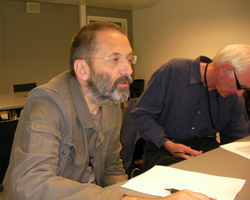 |
Mircea Toma, president of Active Watch, Romania, during a session. |
Study Showing Freedom of Expression Funding Difficult Released by Cox Center at Global Conference in Norway
Organizations promoting freedom of expression are having increasing difficulty finding funding for their work, according to a study released at the Global Forum on Freedom of Expression in Oslo, Norway, in early June.
The study, conducted by researchers at the University of Georgia in the United States, showed that a majority of members of the International Freedom of Expression Exchange said it is more difficult now versus a year ago to find funding both for specific programs in the freedom of expression area and for core funding for the organizations themselves.
The problem often is a mismatch between donor interests and the freedom of expression goals of IFEX members, according to the study. IFEX members also said that donor priorities are changing, often leaving freedom of expression activities without adequate support.
Donors also are more likely now than in the past to expect evidence their programs actually had an impact and are more likely to impose more stringent reporting requirements on organizations doing freedom of expression work that in the past.
Dr. Lee B. Becker, director of the James M. Cox Jr. Center for International Mass Communication Training and Research at the University of Georgia, gave three separate presentations on the research findings during the six-day conference, organized by IFEX, Fritt Ord (The Freedom of Expression Foundation) and Norwegian PEN.
The meetings were held at a variety of venues in central Oslo and were attended by more than 500 journalists, writers, activists and advocates for freedom of expression from more than 120 countries.
In his remarks at the opening ceremony of the conference, Jonas Gahr Store, Norwegian Minister of Foreign Affairs, told those gathered that “The world suffers from a deficit of freedom of expression.”
The Cox Center, the international outreach unit of the Grady College of Journalism and Mass Communication at the University of Georgia, conducted the research on freedom of expression funding for IFEX. The work was funded by the Open Society Institute.
Sixty-two of the 80 IFEX members completed the survey between the middle of March and early May. Most answered questions online in response to requests from IFEX and the Cox Center. Several were interviewed by telephone by members of the Cox Center staff.
The survey found that the dominant source both for project and core funding is foundations outside the country of the member and that members report that half of their budgets comes from projects, and about a quarter comes from core funding.
The Open Society Institute dominated the list of funders for IFEX members--five years ago and now--with the National Endowment for Democracy figuring prominently as well.
Almost all IFEX members said in the survey that they face challenges in finding funding. About half said funders are requiring them to do things that they did not require five years ago. Members said that funding sources that had supported their work in the past were no longer supporting them.
Dr. Becker gave a summary of the research findings to members of IFEX on June 2, the second day of the conference. Approximately 80 persons were in attendance. On June 3 he gave a summary of findings to 12 representatives of funding organizations in attendance. On June 4, Dr. Becker again summarized the research findings to four persons from the conference who had not attended earlier sessions.
In each of the presentations, Dr. Becker was joined by Anne Game, executive director of IFEX, or Maureen James, outreach development coordinator of IFEX.
Following the June 4 presentation, Dr. Becker joined a meeting in Washington, D.C., via a teleconference call of the advisory board of the New Media Women Entrepreneur. The Board judged 435 applications for three $10,000 grants to fund entrepreneurial projects in the media area.
This was the second year Dr. Becker had served on this board. The competition is funded by the McCormick Foundation and organized by J-Lab: The Institute for Interactive Journalism at American University.

